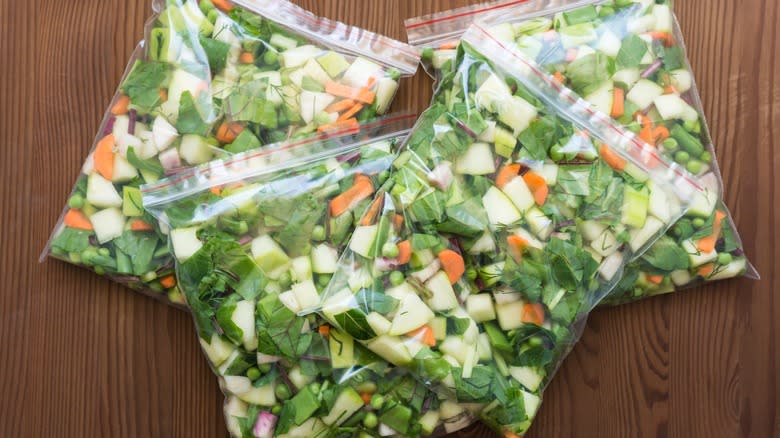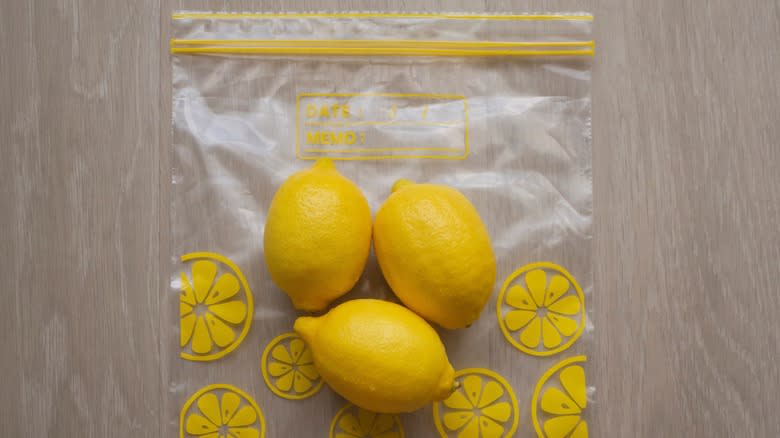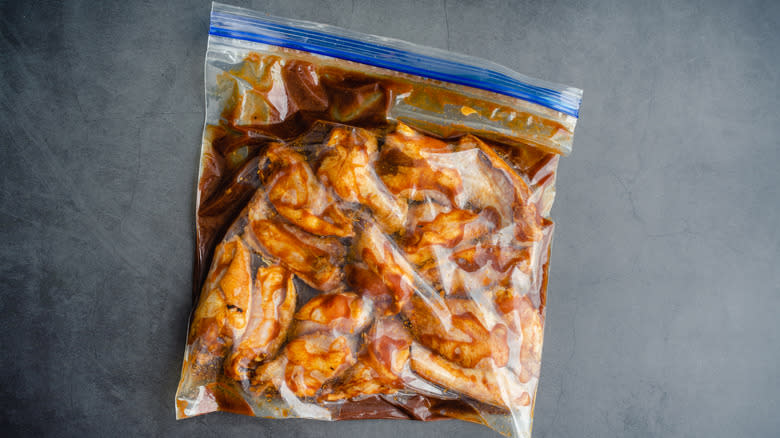There's Nothing Stopping You From Reusing Zip Top Bags

If you ever try to keep track of how much single-use plastic you go through, you'll notice how easy it is to use it without even thinking. It's little wonder why we have an international crisis of plastic pollution, which is even affecting our tap water (and you could end up eating plastic you throw away, too). Sadly, recycling isn't a magic eraser, as many common types of plastic aren't recyclable at all. The best way for us to reduce plastic waste is simply to use less of it.
Flexible plastic, which makes up the bags and wraps used for food packaging, is a common pitfall. Most municipal recycling programs won't accept it, with only about 2% of it actually being recycled (via GreenBiz). These products are also so convenient, it seems impossible to give them up — there's no easier tool to divvy up leftovers or send snacks with your kids. Many of us also use these bags because they can simply be thrown away when you're done, but what seems like a boon on a lazy day only contributes to your single-use plastic habit.
The good news is that those zip-top baggies don't need to end up in the trash after a single use. Just like a reusable plastic container, you can wash your bags and reuse them. There are a couple of cases where this isn't advisable, but generally speaking, if a plastic baggie is still in one piece, there's no reason not to use it again.
Read more: The Best Way To Clean That Nasty Grease Off Of Your Kitchen Cabinets
How To Wash And Dry Plastic Zip-Top Bags

Unless you grew up in a very thrifty household, the idea of washing and reusing plastic bags might seem a little odd. The process can be skipped altogether if you drop them in favor of reusable containers, and some companies now make reusable zip-top bags that are like a sturdier version of disposable baggies. But if you still have some disposables on hand, it's best to get as much use out of them as you possibly can.
As long as your zip-top baggies aren't ripped or otherwise unusable, just give them a careful wash and dry, and then fill 'em up with snacks again tomorrow. To do so, wash the insides of the bags with dish soap and warm water. It might seem more efficient to flip them inside-out and wash them that way, but manufacturers don't recommend this as, you run the risk of ripping the delicate side seams.
You can actually buy special racks for drying plastic bags, but some thrifty home cooks hang dry theirs upside-down by tying a string over the sink to form a sort of makeshift clothesline, then pinning the ends of the baggies to the line. This way, any remaining water will fall into the sink as the bags dry. Easy enough, right? The only other factors to keep in mind are times when you definitely won't want to reuse your bags.
Cases Where You Shouldn't Reuse Plastic Bags

Zip-top baggies are a convenient way to marinate meat or fish, but they absolutely should not be reused after contact with raw proteins, which also includes eggs. These raw foods carry bacteria that can make you seriously ill, and putting other food in the bag afterward makes it susceptible to cross-contamination. That's not even to mention that you can get germs all over your sink, sponges, and kitchen counters by washing the contaminated bags. This is also why you should never wash raw chicken, red meat, or other animal proteins before cooking.
Additionally, you'll want to avoid reusing plastic bags when preparing food for folks with allergies. Trace amounts of allergenic substances can be left behind on the plastic, even after a thorough washing. And to get the most use out of your zip-top bags, you'll primarily want to use them for solid, dry food items that won't leave much residue, and will be easy to clean out (think cereal, chips, or pretzels).
If zip-top bag is starting to discolor, turn cloudy, or you otherwise can't seem to get clean, it's probably time to retire it. When that happens, look into recycling programs that specifically focus on plastic bags and films. Many major grocery store chains are willing to recycle these materials, functioning as convenient drop-off sites you can hit up anytime.
Read the original article on Daily Meal.

